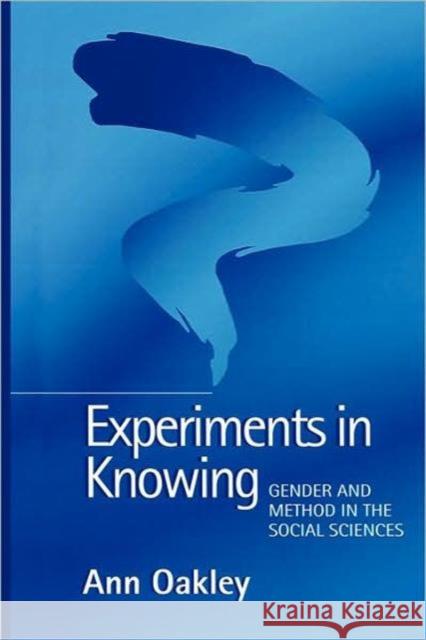Experiments in Knowing: Gender and Method in the Social Sciences » książka



Experiments in Knowing: Gender and Method in the Social Sciences
ISBN-13: 9780745622576 / Angielski / Miękka / 2000 / 416 str.
Experiments in Knowing: Gender and Method in the Social Sciences
ISBN-13: 9780745622576 / Angielski / Miękka / 2000 / 416 str.
(netto: 206,16 VAT: 5%)
Najniższa cena z 30 dni: 132,51 zł
ok. 16-18 dni roboczych.
Darmowa dostawa!
Experiments in Knowing explores the history, ideology and implications of different 'ways of knowing'.
′This is a wonderfully iconoclastic book which will disturb both admirers and critics of social science research. Experiments in Knowing offers a lucid critique of quantitative and experimental methods, and a powerful argument for continuing to use and respect them. It convinced me of the possibilities of a more humane and gender–encompassing social science.′
Alice Kessler–Harris, Professor of History, Columbia University
′Ann Oakley continues to teach me more than any other researcher with whom I have worked closely. The example she sets in this challenging new book should be a rallying point for all those researchers who purport to be interested in assessing how to minimize harm and maximize benefit in health care, social care and education.′ Iain Chalmers, Director, The UK Cochrane Centre
′Buying this book will permit the reader to retire a dozen or more books from the shelf. It claims to be about the history and sociology of ways of knowing and is alarmingly informative on each account. Moreover, it is about how to think well about difficult topics, including the role of controlled experiments in assessing contemporary social interventions. This book is not for those who value rhetoric over realism. It is excellent reading.′ Dr Robert Boruch, University of Pennsylvania
′It is not possible to do justice here to Experiments in Knowing; this book is a tour de force, big in every sense. It is long, dense and intensely argued, and it covers an impressive scope from fourteenth–century scholarship to present day debates ... I want to emphasize the comprehensive nature of the book and the validity of the problems and questions that Oakley raises. Her ideas deserve and need to be debated by all of us who do seek to contribute to social improvement – in whatever form this takes.′ Social Policy
′[I have] a much enriched understanding of the gendering of ways of knowing brought about by this book. Let us thank Ann Oakley for her urging us to move on to purposefully ′disclose relations not otherwise apparent′, by continuing with systematic enquiry while ending androcentrism.′ British Journal of Sociology
Part I: Modern Problems.
1. Who Knows?.
2. Paradigm Wars.
3. Hearing the Grass Grow.
Part II: A Brief History of Methodology.
4. Cartesian Nightmares.
5. Mean Values.
6. Imagining Social Science.
7. Chance is a Fine Thing.
Part III: Experiments and Their Enemies.
8. Experimental Sociology: The Early Years.
9. Of NITS and LIFE and Other Things.
10. Lessons from America.
11. The Rights of Animals and Other Creatures.
Part IV: Moving On.
12. People′s Ways of Knowing.
13. Challenges of an Experimenting Society.
References.
Ann Oakley is Professor of Sociology and Social Policy and Director of the Social Science Research Unit, University of London Institute of Education.
This important book explores the history, ideology and implications of methodology or ′ways of knowing′ in the social and natural sciences. It extends arguments developed in the author′s previous work that divisions between ′quantitative′ and ′qualitative′ methods are unhelpful in the pursuit of useful knowledge, and that a major challenge facing scientists, academics and the public today is the need to scrutinize the claims professionals of all kinds make to possess effective expertise. The rejection of ′quantitative′ and experimental ways of knowing, in particular, prevents us from understanding both the parameters of social inequality and the effects of professional interventions in people′s lives. As a methodological position adopted by feminists, postmodernists and others, it obstructs the development of a critical and emancipatory social science.
Oakley examines the historical development of methodology in the social and natural sciences and argues that these disciplines have been subject to a process of ′gendering′. This has produced an ideological reaction against, rather than a relevant understanding of, the role of ′quantitative′ and experimental methods. She suggests that there are considerable problems with a retreat into ′qualitative′ methods as offering a more democratic way of knowing. A strong focus on the development, uses (and abuses) of experimental ways of knowing provides a critical analysis of current public understandings in this area; the book demonstrates that many early developments using the experimental approach took place in social science, and not only in medicine, as is commonly believed.
Experiments in Knowing fills an important gap in the methodological literature, and is likely to generate considerable debate. It addresses themes of common interest across many different fields, including social policy, health and education research and women′s studies.
1997-2026 DolnySlask.com Agencja Internetowa
KrainaKsiazek.PL - Księgarnia Internetowa









